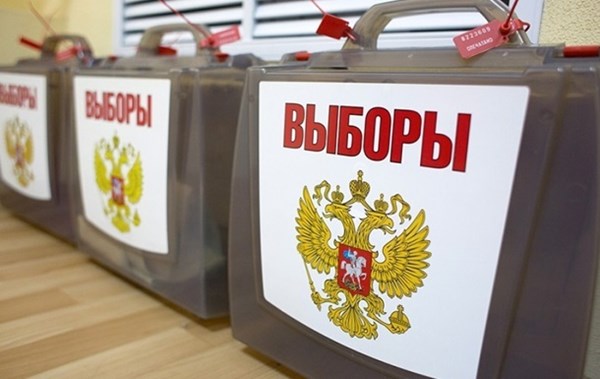Ukraine urges the EU to introduce sanctions against the organizers of the Russian Presidential elections in the Crimea
Ukraine called on the European Union to impose sanctions against the organizers of the "fake elections" in the territory of annexed Crimea, as stated by President of Ukraine Petro Poroshenko on March 12 following the meeting with the High Representative of the European Union for Foreign Affairs and Security Policy, Federica Mogherini.
"Regarding the Russian Presidential elections next Sunday, I made it clear that Ukraine does not recognize fake presidential elections on the temporarily occupied territories, since Russians are going to conduct the so-called voting there as well. We are sure that it is necessary to impose sanctions against persons involved in organizing an illegal electoral process," the Ukrainian president told journalists.
"I called on the European Union to do the same in response to the so-called elections," Poroshenko said. The press service of the Ukrainian president reported that the head of European diplomacy, Federica Mogherini said that "the European Union does not recognize an illegal annexation” as well as "so-called elections" in the Crimea.
"We will continue this policy of non-recognition. We will continue to condemn this violation of international law. We do not recognize the so-called elections there. We will continue the policy of non-recognition, especially because of sanctions within the framework of this issue. We will continue to call for respect for the rights of all Ukrainians, including Crimean Tatars. We will continue to call for the release of all those detained and convicted in violation of international law," Mogherini said.
The Mejlis of the Crimean Tatar people issued an appeal on March 12 that mentions the "unprecedented pressure" exerted by the occupation authorities on Crimean Tatars in the Crimea.
"The Mejlis of the Crimean Tatar people notes unprecedented pressure and direct threats against Crimean Tatars from Russian invaders and local collaborators to force them to participate in illegal elections. Notable populations representatives [such as] clerics, teachers, doctors, businessmen, employees of municipal enterprises and organizations, students, athletes and seniors are subject to severe moral and psychological blackmail," the organization's leader MP Refat Chubarov posted on Facebook.
The document indicates that the clear majority of Crimean Tatars, who live in all cities and regions of the Crimea, "are full of dignity and courage not to give in to blackmail and threats made by the Russian occupiers."
The Verkhovna Rada called on the international community "to boycott and to not recognize these so-called presidential elections of the Russian Federation, organized in the Crimea which is occupied by the Russian Federation." This was part of a statement released by the Verkhovna Rada’s press service on March 12.
On March 1, the Ukrainian Parliament claimed that Russian authorities were illegally attempting to hold presidential elections in the Crimea and Sevastopol on March 18, 2018. This was stated in the resolution, in which the Ukrainian people's deputies appeal to the international community "in connection with the illegal preparation of the presidential elections on the temporarily occupied territory of Ukraine."
This decision was supported by 255 people's deputies with the minimum required 226 votes of the unicameral Ukrainian parliament.
Washington does not recognize the Russian presidential elections to be held on the annexed Crimea, stated the US Ambassador to Ukraine Marie Yovanovitch on Pryamyi TV on March 4. "As with all the elections in the Crimea, the way we treated these elections in the past is such that we did not recognize them," Yovanovitch stressed.
As reported by the All-Ukrainian Association Svoboda on its website, the joined forces of nationalists—Svoboda, Right Sector and National Corps—will not allow voting on March 18 on the territory of diplomatic missions of Russia in Ukraine.
"Ukrainian nationalists consider it unacceptable from the point of view of common sense and morality, because the Kremlin will hold its so-called presidential elections as well on the territory of the annexed the Crimea and occupied Donbas," Svoboda stressed in its statement.
Political scientist Mikhail Basarab told the Voice of America that in international political discourse, Russia has long been considered an authoritarian political regime.
"Therefore, the procedure for democratic elections in Russia is always threatened by large-scale violations of citizens' rights and the electoral process. This allows democratic countries to criticize the process of election campaigns in Russia. Many Ukrainian politicians have long been talking about presidential elections in Russia, not as free elections but as a reassignment of Vladimir Putin to this post," Basarab told a Russian Voice of America correspondent.
He recalls that the so-called presidential elections in the Crimea were appointed, according to Ukraine's position, by an illegitimate State Duma.
"In 2016, the Verkhovna Rada, following the initiative of [former Prime Minister] Arseniy Yatsenyuk adopted a resolution on non-recognition of elections to the State Duma on the basis of organizing the electoral process and voting on the territory of the Crimean Peninsula. Therefore, when we talk about the so-called elections of the Russian president in the Crimea, appointed by the illegitimate State Duma, according to Ukraine's positions, and representatives of the Ukrainian political establishment and Western politicians, officials have repeatedly spoken in this regard: elections on the peninsula's territory will definitely not be recognized. This will lead to the corresponding assessments of the election of the Russian president overall," Basarab said.
According to the political scientist, the organization of the electoral process on the territory of the Crimea, and the non-recognition of its legitimacy on the occupied peninsula will not mean that Western politicians will stop meeting with Vladimir Putin.
"However, these elections and the voting process on the territory of the occupied Crimea will be unequivocally qualified as a gross violation of international law, a grave violation of the rights of the inhabitants of the peninsula. It will become a serious basis for the relevant political statements, assessments and, probably, the expansion of sanctions against Russia," Basarab concluded.
